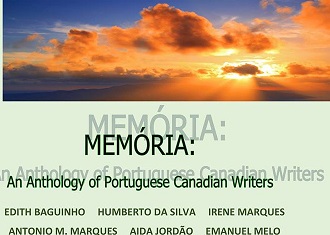Book Review: Memória: An Anthology of Portuguese Canadian Writers
Memória: An Anthology of Portuguese Canadian Writers
Edited by Fernanda Vivieros
Fidalgo Books
Reviewed by Lise Watson
This ground-breaking collection of literary work by Portuguese Canadians is a joy to read. Fernanda Vivieros and her editorial team have done a wonderful job of selecting and editing a wide range of talented writers and their works. Each author shares his or her thoughts, feelings and memories in touching and affecting styles which include poetry, short stories, memoir and drama.
Many of the pieces have a clear Portuguese identity, while others less so. We can relate to much of the sentiment, whatever our background, and we can enjoy the quirks and curiosities of the Portuguese cultures found in Canada and back in the motherland.
The text comes in both English and Portuguese which lends an attractive authenticity, and even where the Portuguese is not translated to English, it is easy to understand the flow. The majority of featured writers are male, with only four out of fifteen being female. It is hoped that the next volume will unearth many more talented women.
Funeral in White is an extraordinary play which criss-crosses the ocean with Albertina and her family. Aida Jordão is masterful in her creation of sympathetic and complex characters and at the same time painting a fascinating portrait of the realities of the life of women in Portugal in the 1940s and beyond. The staging includes fado music and guitar and it is my great regret that I did not see the 1991 production at Toronto’s Theatre Passe Muraille.
Avó Lives Alone by Emanuel Melo is a beautifully told tale of a Portuguese Canadian widow who insists on remaining alone in her marital home long after the passing of her husband Antonio. Surrounded by her memories, she takes comfort in her routine of going to mass, preparing simple meals and watching Portuguese language television shows such as the Portuguese version of the Price Is Right and the news. She lives for contact with her two sons and her granddaughters, favouring the youngest son who has given her grandchildren over the other who is the most constant in his affection and attention. Each conversation with the elder son ends with an enquiry after the younger and his daughters, and the expression of her sadness in the long gaps between contact with them.
The passivity of Avó contrasts sharply with Fred of The Last Shot, a short story written by Antonio M. Marques. Retired and also outliving his spouse, Fred is less keen to spend time with his son’s family. He does not want to become a nuisance and unwanted, and although he is also lonely, in the end he chooses to take control of the situation, taking one last shot at happiness.
The short stories Confessions of an Altar Boy (Clement Alves) and One Man’s Island (Tony Correia) are veritable feasts for the senses. Confessions… introduces us to the religious fervour of a young man, envelopes us in the musty smells of the vestuary in his community Catholic church, and gives us a true sense of his high anxieties in his role as altar boy.
One Man’s Island tells of an immigrant father who is determined to keep chickens in the back yard at the family home in Brampton, Ontario, makes wine and sausages, works a vegetable garden and plants flowers year round in a greenhouse, and hangs and butchers hogs in the garage. I love the phrasing in this story: “I was too young to get a job, but old enough to be embarrassed by my Portuguese parents.” And “By today’s standards, my father’s activities would be classified as ‘sustainable’ but in the late 70s he was just a capital ‘I’ immigrant.” The latter sheds light on the irony that the old ways, once scorned, are now in style for hip environmentally conscious young Canadians.
Poetry is abundant in this collection, with those by Laureano Soares being particularly poignant. The Cardboard Suitcase speaks to the hopes, dreams, and ultimate disillusionment of new immigrants, Remembering lovingly pays tribute to the ‘people’ of the village back home.
There was a packed house at the Toronto launch of Memória in November of 2013 at the Alberto Castro Gallery inside the Casa do Alentejo Cultural Club. What a special celebration it was, complete with warmly received readings by Emanuel Melo, Aida Jordão, Antonio M. Marques, Irene Marques, Edith Baguinho and Humberto Da Silva.
Memória is available through the University of Toronto Bookstore and Amazon.


